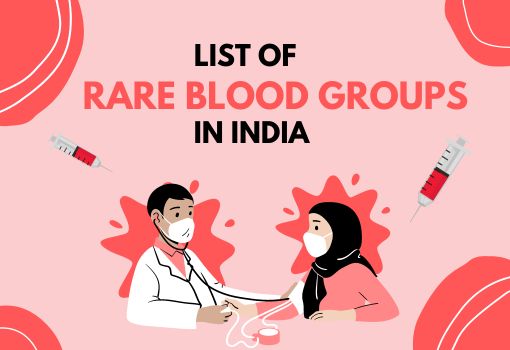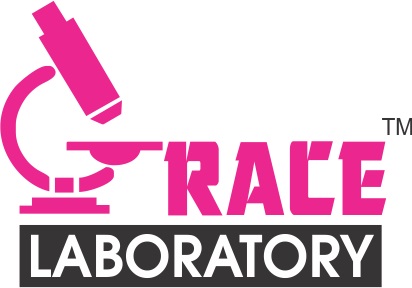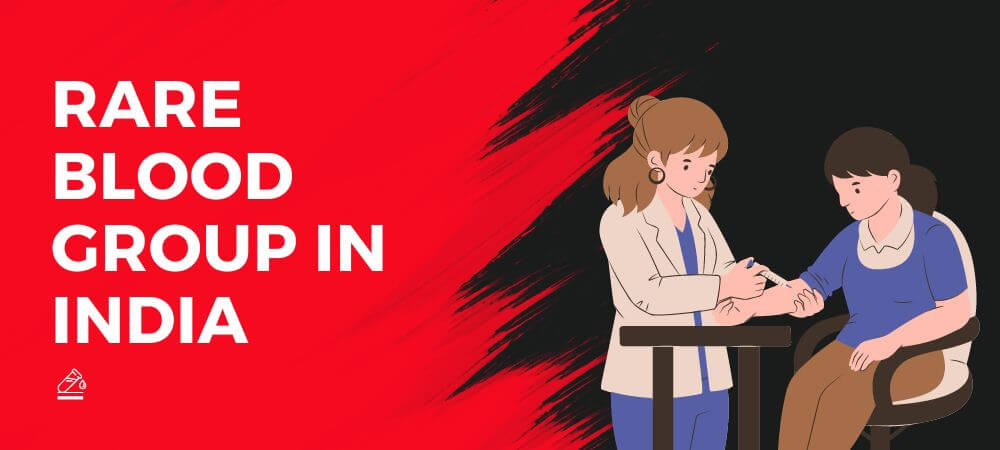Introduction
We all know the importance of blood in the human body, but did you know there are rare blood groups in India? Many individuals with rare blood groups worldwide face difficulty obtaining compatible blood during a blood transfusion.
In this article, we will discuss blood group types, the significance of blood donation in saving lives, and answer which blood group is rare in India.
Understanding Blood Groups and Their Types
A blood group type is a classification system that a healthcare provider uses to determine the compatibility of your blood with other blood types. The primary blood group types are A, B, AB, and O.
A blood type is determined based on the presence or absence of two antigens, A and B, in the red blood cells.
In simple terms, your blood group type is:
- Type A: If red blood cells have the A antigen.
- Type B: If red blood cells have the B antigen.
- Type AB: If red blood cells have both A and B antigens.
- Type O: If red blood cells have neither A nor B antigens.
In addition, there is another antigen known as the Rh factor. People are classified as positive (+) if they have this protein or negative (-) when absent. RhD positive is a more prevalent blood type than RhD negative.
| Blood Group | Antigen | Antibody | Rh Factor (Antigen D) |
| A+ | A | Anti-B | Present |
| A- | A | Anti-B | Absent |
| B+ | B | Anti-A | Present |
| B- | B | Anti-A | Absent |
| AB+ | A & B | None | Present |
| AB- | A & B | None | Absent |
| O+ | None | Anti-A & Anti-B | Present |
| O- | None | Anti-A & Anti-B | Absent |
The eight main blood types include:
- A+ (A positive)
- A- (A negative)
- B+ (B positive)
- B- (B negative)
- AB+ (AB positive)
- AB- (AB negative)
- O+ (O positive)
- O- (O negative)
Blood Type Compatibility Table
The table below depicts blood type compatibility:
| Blood Type | Who you can give blood to | Who can receive blood from |
| A+ | A+, AB+ | A+, A-, O+, O- |
| B+ | B+, AB+ | B+, B-, O+, O- |
| AB+ | AB+ | Everyone |
| O+ | O+, A+, B+, AB+ | O+, O- |
| A- | A+, A-, AB+, AB- | A-, O- |
| B- | B+, B-, AB+, AB- | B-, O- |
| AB- | AB+, AB- | AB-, A-, B-, O- |
| O- | Everyone | O- |
What Rare Blood Groups Are Found in India?
Rare blood is found in 1 in 1,000 people in a given population. However, the rare nature of a blood type may vary from population to population, country to country.
AB- (negative) is the rarest of the eight main blood groups, found in only about 1% of donors. It is even less common in India, with less than 1% of the population having it. Other rare blood types in India include O-, A-, and B- (negative).
Another rare blood group type in India is the Bombay Blood Group (Oh), also known as the HH blood type or the ABO blood group. Discovered in 1952, only one in 10,000 Indians have this blood group.
In 2022, a man from Gujarat was identified with a unique blood group called EMM negative blood group. It became India’s first and the world’s tenth case, with only nine other people known to have this blood group.
However, Rhnull, also known as the Golden blood type, is the rarest of all blood groups worldwide. Rh null donations are incredibly scarce and difficult to obtain, with only nine active donors globally.
Individuals with Rhnull do not have Rh antigens (proteins) in the red blood cells. There are less than 50 people worldwide who have this particular blood type.
List of Rare Blood Groups in India

Here is the list of some of the rare blood groups found in India:
- Bombay (Oh) phenotype
- AB-
- – D -/- D –
- In(a+b-)
- Co(a-b-)
- A host of weaker variants of A, B, and H antigens
- I-i-
- CdE/CdE (ryry)
- Mg
The Importance of Blood Donation
Individuals with rare blood groups often find it difficult to obtain blood transfusions or organ transplants. A mistaken transfusion can lead to kidney damage or even prove fatal for the recipient.
For instance, if a blood type is incompatible with a developing fetus, it may lead to complications in pregnant women with rare blood types.
People with rare blood groups often rely on blood donations from others. Therefore, donating blood is crucial as it can provide compatible blood for those with rare blood types.
Should You Donate Blood?
Blood donation is an act of kindness, so if you are fit enough to donate blood, you should consider doing so. This becomes even more important if your blood type is rare, as you know the value of such blood types.While blood donation can boost immunity and demote the possibility of cancer in donors, it can save the life of recipients. You can consult a doctor for clarification if you have further doubts regarding your blood type or donation.
If you want to get your blood tested, you can visit us at Grace Laboratory in Vadodara and book an appointment or call us.
FAQs
1. Is A1 Positive a rare blood group in India?
A positive blood group is very common in India. Therefore, A1 positive cannot be considered a rare blood group in India.
2. Is O Negative blood group rare in India?
Yes, O- (Negative) blood group is rare in India. It is found in only 1.43% of the Indian population.
3. Which blood type is a universal donor?
O negative (O-) is the universal donor; it means people with any other blood type can receive it safely. However, an O- person can receive blood from another O- person only.
4. Which is the most common blood group in India?
The most common blood groups in India are B+ and O+.
References:
https://www.ncbi.nlm.nih.gov/pmc/articles/PMC3353629/

